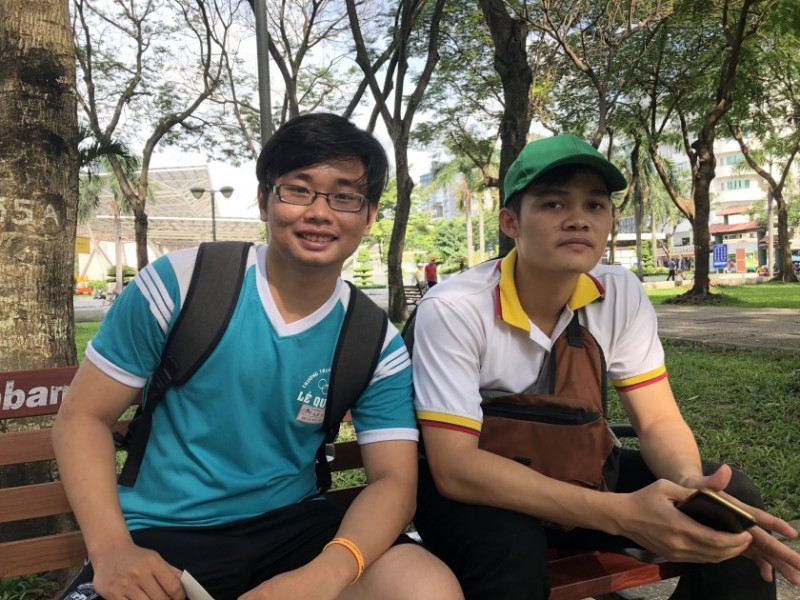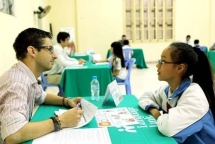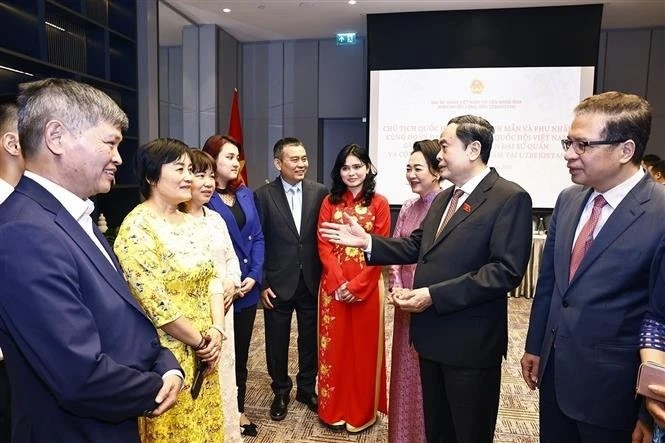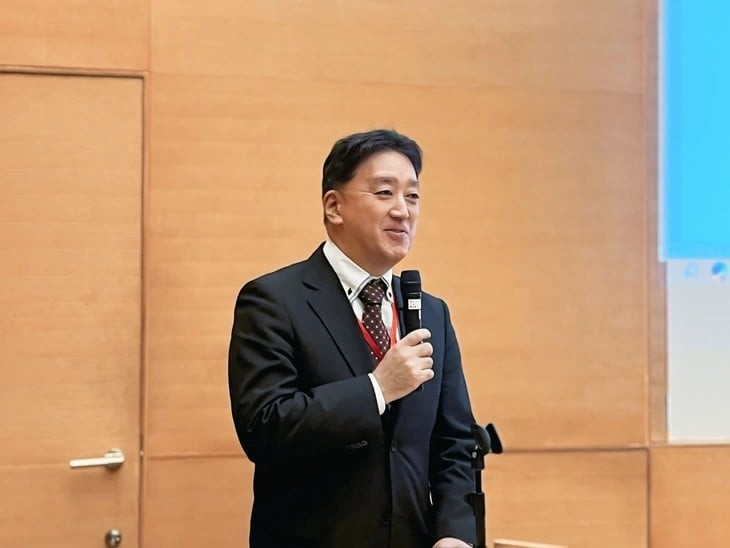Vietnamese flock to this park to "catch" a tourist — and learn English for free
| HCM City aims for all students to learn English from first grade | |
| Vietnamese woman takes rural students to royal city in order to learn English |
 |
| Bui Hoang Duc Bui, left, and Chanh Do Van wait at Ho Chi Minh City’s September 23 Park on Nov. 4, 2019, for foreign tourists willing to help them practice English.(Ralph Jennings / For The Times ) |
Eranio Huong has never visited a Western country but speaks English with near-native fluency, down to using “like” as a hesitation word and starting sentences with a drawn-out “so.” The 27-year-old from a poor village in central Vietnam couldn’t learn much of the language in high school or at her university. She never hired a tutor.
Yet by the time she got her accounting degree from Open University in Ho Chi Minh City, formerly Saigon, Huong knew enough of the language to walk into a job fair dominated by foreign companies and get hired virtually on the spot. Now she runs two cafes, both named Coffee Talk English, that are set up to promote conversation.
Huong learned English every afternoon for three years in a public park famous for attracting Western tourists. There she braved pickpockets, pickup attempts, downpours and her family’s disapproval, all because the language skill matters so much that it can quintuple an entry-level salary.
“I’m quite stubborn, and they know it, so they told me to be careful and that was it,” Huong said, recalling her parents’ initial shock. Now they see the first cafe, the larger one, and get it.
Vietnam was torn by war in the 1950s, ‘60s and‘70s, and it’s now getting an economic foothold because of rapid inflows of foreign investment into export manufacturing. “We’re all trying to do business with foreign countries, because that’s where the money is, so companies require their employees to [be able to speak] English,” Huong said.
So popular is English that the number of foreign language and computer teaching centers in Ho Chi Minh City surged to 1,250 as of January, the British recruitment service BMI says.
But those places charge fees that people such as Huong can’t afford.
Eight years ago, Huong joined 20 other university students in Ho Chi Minh City’s September 23 Park. They would approach Western tourists and speak to them in English for as long as the tourists would engage. Many of the visitors were from the United States, once the wartime enemy. The group’s tactic grew into a routine so familiar that long-stay tourists who know the city today sometimes go to the park in hopes of of meeting a local student for conversation.
The flat, rectangular green space stretches about 500 yards under palms, past a fenced-off pond and along rows of equipment for speed walking and chin-ups. Tourists take a break from sightseeing to rest on park benches.
Tourists don’t charge for English. Many appreciate the chance to chat with a Vietnamese person. A few stick out a hand to decline conversation. But people such as Tom Penrose offset them.
On several afternoons, the 70-year-old Vietnam War artillery team veteran sat on a two-person wooden bench waiting for someone to come up and say, “Excuse me, do you have a moment?” He spent more than an hour talking to a college senior one Monday afternoon in November.
Penrose talked about his family and retirement in quiet but slow English, head turned to the right so the student sitting next to him could follow. The student, head cocked left and face tensed to make sure he grasped every word, got it and replied with a description of the village near Cambodia where he grew up.
On the same muggy Monday pushing 91 degrees, Bui Hoang Duc and classmate Chanh Do Van came to the park to do what many students describe as “catching” a tourist. The third-year marine navigation undergraduates at Ho Chi Minh City University of Transport come twice a week after morning classes let out. They need English to work for shipping lines after graduation.
Duc, 20, donned a school backpack and the shirt that was part of his old blue-and-white high school uniform as a signal to Western tourists that he’s after an education rather than something commercial. Van, also 20, wants to become a captain with an international shipping line. Maritime communication and written laws are almost always in English. Van knows Vietnam needs more people in the navigation field.
Huong, the cafe owner, first tried the park one afternoon about three years ago when she couldn’t stand her shared student housing with no air conditioning. She ran into a group of other students surrounding a foreign traveler. The foreigner said “hi” but she didn’t know how to answer. Her silence embarrassed her, but it would have been more embarrassing to leave, so she stayed.
Things went better the day she met a tourist from Chicago. She said to him in unwavering English, “Hi, I’m a student. I just want to practice my English. Can I talk to you for five minutes?” The seated man, Robert Smet, said sure. Huong asked whether it was his first time to Vietnam, but it turned out he visits every November as vacation time allows. He calls Vietnam his “second home” and says he’s “not interested in going to other places.”
“That’s amazing,” she replied. When she learned that he likes vegetarian food, Huong told him how to find it and order it in Vietnamese. She excused herself then — the five minutes were up.
But the dialogue wasn’t over. Smet, 61, an environmental engineer, now helps Huong teach English in her cafes on his annual returns to Ho Chi Minh City — among his 20 trips total so far to Vietnam.
“Huong and I have been in contact since then and during my last trip,” he said. “She was one of four or five that comprised a core group of students whose English was already good and I liked helping them improve their pronunciation.” At the cafes, he said, “I enjoy working with the students at no cost.”
Other students in Huong’s group have moved overseas for work. Nguyen Van Thien, who stayed behind, leads tours in Vietnam and operates a professionally produced YouTube travel channel called Sky Nguyen. They’re all averaging wages higher than the minimum because of their fluency, Huong said.
Two years ago, on one of his more memorable park encounters, Thien asked a stranger for 10 minutes of his time and offered to share information about Vietnam.
The counterpart, an Australian bank employee of Vietnamese descent from Sydney, was looking for restaurant adventures. Thien told the visitor, 30-year-old Peter Tran, to try beef noodle soup, pancakes and snake meat. “In Vietnam you will have a chance to eat some crazy thing that you never had back home,” he told Tran with a laugh. Tran laughed too.
Thien, now 23, said he felt lost when he first began exploring the park in 2016, but gradually felt more comfortable there. “I started learning English because I was very interested in talking and I’m a very talkative person,” he said. “I even skipped my classes to go to the park and talk.”
So popular is the park that a Facebook group called Talking With The Tourist formed in 2013 to lead groups of a couple dozen per session to the park’s benches and pavilions where foreigners sit.
There’s a group of African regulars who argue loudly among themselves. A few people deal drugs. A pickpocket could be anywhere, likewise the foreigner looking for a hookup rather than a chat. Add to that the thwacking sounds of dozens of people who play a local version of hacky sack on the pavement.
Huong grew used to the obstacles. To inspire other students, her original cafe that’s a quick taxi jaunt from the park posts a sign in English that reads: “No excuses.”
Recommended
 Handbook
Handbook
Vietnam Moves Up 8 Places In World Happiness Index
 Handbook
Handbook
Travelling Vietnam Through French Artist's Children Book
 Multimedia
Multimedia
Vietnamese Turmeric Fish among Best Asian Dishes: TasteAtlas
 Handbook
Handbook
From Lost to Found: German Tourist Thanks Vietnamese Police for Returning His Bag
 Handbook
Handbook
Prediction and Resolution for the Disasters of Humanity
 Handbook
Handbook
16 French Films To Be Shown For Free During Tet Holiday In Vietnam
 Handbook
Handbook
Unique Cultural and Religious Activities to Welcome Year of the Snake
 Handbook
Handbook




